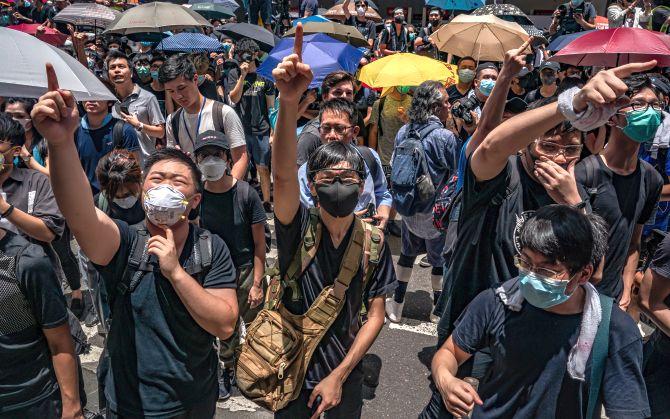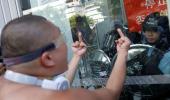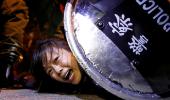Chinese President Xi Jinping on Tuesday signed a controversial security law that gave Beijing new powers over Hong Kong that are tailor-made to crackdown against dissent, criminalising sedition and effectively curtailing protests, amidst global anger and outrage in the former British colony.

Xi signed the legislation soon after Chinese lawmakers voted unanimously to adopt the Law of the People's Republic of China on Safeguarding National Security in the Hong Kong Special Administrative Region.
The law -- facilitating the presence of Chinese security offices in Hong Kong, besides prohibiting acts of secession, subversion, terrorism and collusion with foreign forces to endanger national security -- was passed by the 162-member Standing Committee of China's legislature the National People's Congress.
As soon as the draft legislation was adopted by the NPC, regarded as the rubber-stamp Parliament for its routine approval of whatever the ruling Communist Party of China proposes, Xi signed it immediately, making it into law ready for implementation.
The United States, the United Kingdom, the European Union and NATO have expressed concern on the new law and warned of retaliatory measures.
US Commerce Secretary Wilbur Ross said Washington has suspended regulations allowing Hong Kong to import US technology because of security risks posed by the law, which he said would undermine the city's semi-autonomous status.
The law would heighten the risk that sensitive US tech exports to the city -- including metal alloys, high-powered computers and lasers -- would be diverted for use by the Chinese military or the Chinese Ministry of State Security, Ross was quoted as saying by the Hong Kong-based South China Morning Post.
"Further actions to eliminate differential treatment are also being evaluated," Ross said in a statement issued in the US. "We urge Beijing to immediately reverse course and fulfil the promises it has made to the people of Hong Kong and the world," he said.
The US was Hong Kong's second-largest trading partner in 2019, with trade worth USD 67 billion, official data showed.
The EU condemned Beijing's move, saying it is "in the process" of considering follow-up action with lawmakers and international partners.
"We deplore this decision. This law risks seriously undermining the high degree of autonomy of Hong Kong, and having a detrimental effect on the independence of the judiciary and the rule of law," European Council President Charles Michel said.
The European Parliament earlier this month passed a raft of recommendations for action against China over the legislation. The recommendations included imposing sanctions, providing a "lifeboat policy" for Hongkongers wishing to leave the city, and taking Beijing to the International Court of Justice for violating its commitments on Hong Kong's autonomy.
European Commission head Ursula von der Leyen said, "Many across Europe, including in the European Parliament, have made similar statements, so we remain in touch with our international partners on this matter, and will pay careful attention on how to respond."
UK Foreign Secretary Dominic Raab said a statement would be released once the full text of the legislation was made available. He said the UK is "deeply concerned" over China passing the law.
According to the state-run Xinhua news agency, NPC Standing Committee chairman Li Zhanshu described the law and its unanimous passage as a "reflection of the will of comrades in the whole of the nation including Hong Kong".
Li said the law emphasised resolute and effective efforts to safeguard national security and the constitutional order and the order of rule of law in the Hong Kong Special Administrative Region.
Li said the "one country, two systems" being followed in Hong Kong since it was transferred from Britain to China in 1997 should be steered towards the right direction. The new law would be added to Hong Kong's Basic Law annex, he said.
The law enables China to firm up its grip over Hong Kong, which witnessed protests and riots since last year.
It enables Chinese security agencies for the first time to open their establishments and operate in Hong Kong.
Critics and opposition politicians in Hong Kong warned that imposing the law will erode the city's autonomy and freedoms under the “one country, two systems” principle by which it was to be governed until 2047 under the terms of the former British colony's return to Chinese control in 1997. Beijing has rejected that argument.
Hong Kong Chief Executive Carrie Lam who enjoys the backing of Beijing called on the international community on Tuesday to respect the new law.
In a video message to the UN Human Rights Council, Lam said the legislation would only target an extremely small minority of people who had broken the law, while the basic rights and freedoms of the majority of Hong Kong residents would be protected.
Meanwhile, Demosisto, a key pro-democracy group which spearheaded the protests against Chinese influence, said in a Facebook post that it is ceasing all operations and will function from overseas.
The move was announced after Joshua Wong, one of Hong Kong's most prominent activists, said he was leaving the group.
Demosisto's founding chairman Nathan Law, a former student leader, also quit the group. In a Facebook post, Law said the legislation marked the start of a "bloody cultural revolution" and despite quitting Demosisto, he would continue to fight for democracy "in a personal capacity".











 © 2025
© 2025